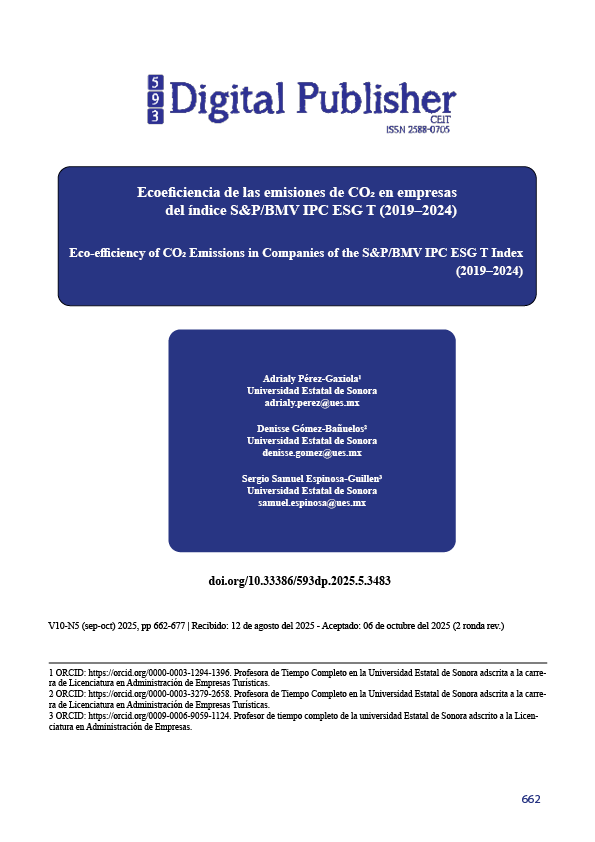Eco-efficiency of CO₂ Emissions in Companies of the S&P/BMV IPC ESG T Index (2019–2024)
Main Article Content
Abstract
Eco-efficiency has been consolidated as a strategic approach within corporate sustainability, as it links improvements in environmental performance with the creation of economic value. In this context, it is crucial to empirically assess the relationship between CO₂ emissions reduction and the economic performance of firms listed in sustainability stock indices, given their role as benchmarks of best practices. This study aims to test the postulates of Eco-efficiency Theory through the analysis of the relationship between CO₂ emissions and operating income in the ten most heavily weighted companies of the S&P/BMV IPC ESG T Index of the Mexican Stock Exchange, covering the period 2019–2024. A quantitative and documentary approach was adopted, based on financial and sustainability reports prepared in accordance with the Global Reporting Initiative (GRI) standards. The eco-efficiency formula was applied to derive annual indices, using 2019 as the base year, and the Pearson Correlation Coefficient was employed to test the consistency of the relationship between the variables. The findings confirm that, in 7 out of 8 companies with complete data (87.5%), reductions in CO₂ emissions were accompanied by improvements in operating income, thereby validating the core propositions of Eco-efficiency Theory. This research provides robust empirical evidence in the Latin American context and underscores the necessity of incorporating environmental indicators into the evaluation of corporate performance, contributing to the ongoing debate on the compatibility between sustainability and business competitiveness.
Downloads
Article Details

This work is licensed under a Creative Commons Attribution-NonCommercial-ShareAlike 4.0 International License.
1. Derechos de autor
Las obras que se publican en 593 Digital Publisher CEIT están sujetas a los siguientes términos:
1.1. 593 Digital Publisher CEIT, conserva los derechos patrimoniales (copyright) de las obras publicadas, favorece y permite la reutilización de las mismas bajo la licencia Licencia Creative Commons 4.0 de Reconocimiento-NoComercial-CompartirIgual 4.0, por lo cual se pueden copiar, usar, difundir, transmitir y exponer públicamente, siempre que:
1.1.a. Se cite la autoría y fuente original de su publicación (revista, editorial, URL).
1.1.b. No se usen para fines comerciales u onerosos.
1.1.c. Se mencione la existencia y especificaciones de esta licencia de uso.
References
Bergougui, B., & Satrovic, E. (2025). Towards eco-efficiency of OECD countries: How does environmental governance restrain the destructive ecological effect of the excess use of natural resources? Ecological Informatics, 87, 103093. https://doi.org/10.1016/j.ecoinf.2025.103093
Bolsa Mexicana de Valores (BMV) (2025). Índices principales. Muestra del Índice S&P/BMV IPC ESG T. https://www.bmv.com.mx/es/indices/principales/
Corvo, H. (2021). Definición de la utilidad de operación. Lifeder. https://www.lifeder.com/utilidad-operacional/
Fernández, M., y Cabrera, L. (2024). El impacto de la ecoeficiencia en la gestión de las PYMEs: Evidencia en América Latina post-COVID. Revista Internacional de Investigación y Educación, 6(2), 45–61. https://a.posgradocolumbia.edu.py/index.php/riie/article/view/92
Global Reporting Initiative (GRI) (2021).Divulgación ASG y de sostenibilidad en mercados de capitals. Una Mirada a América Latina. https://www.globalreporting.org/media/gnelv4de/informe_divulgacion_gri.pdf
Global Reporting Initiative (GRI) (2023). Estándares GRI consolidados. https://www.globalreporting.org/how-to-use-the-gri-standards/gri-standards-spanish-translations/
Heikkurinen, P., Young, C. W., y Morgan, E. (2019). Business for sustainable change: Extending eco-efficiency and eco-sufficiency strategies to consumers. Business Strategy and the Environment, 28(8), 1554–1562. https://doi.org/10.1002/bse.2338
Issa, B., Ben Abdallah, S., y Gabsi, F. B. (2025). Relationship Between Socio-Efficiency, Eco-Efficiency, and Financial Performance of European Companies: A Sector Study. Journal of Risk and Financial Management, 18(4), 171. https://doi.org/10.3390/jrfm18040171
Latella, P., Morea, D., Baldissarro, G., Iazzolino, G., Veltri, S., & Farinelli, E. (2025). Corporate Governance and Impact on Eco-Efficiency: A Comparative Empirical Analysis on European Union and United States Listed Companies. Business Strategy and the Environment. https://doi.org/10.1002/bse.4308
Lazo, D., y Ortega, A. (2024). Efficiency and sustainability of the tourism industry in Latin America. Munich Personal RePEc Archive (MPRA), Paper No. 123619. https://mpra.ub.uni-muenchen.de/123619/
Müller, K., y Sturm, A. (2001). Standardized eco-efficiency indicators: Report from the WBCSD project on eco-efficiency metrics. World Business Council for Sustainable Development (WBCSD). https://www.wbcsd.org/Overview/Past-Projects/Eco-efficiency/Resources/Standardized-Eco-efficiency-Indicators
Nguyen, T. H., Do, D. D., Vu, D. H., Tran, T. T., & Vo, D. H. (2025). From pandemic shock to sustainable recovery: Global eco-efficiency and eco-productivity dynamics. Journal of Risk and Financial Management, 18(9), 473. https://doi.org/10.3390/jrfm18090473
Lazo, D., & Ortega, A. (2024). Efficiency and sustainability of the tourism industry in Latin America. Munich Personal RePEc Archive (MPRA), Paper No. 123619. https://mpra.ub.uni-muenchen.de/123619/
Ramos, G. (2014). Definición de desempeño económico. https://economia.org /desempeno.php.
Rudolf, M., y Schmidt, M. (2025). Efficiency, sufficiency and consistency in sustainable development: Reassessing strategies for reaching overarching goals. Ecological Economics, 227, 108426. https://doi.org/10.1016/j.ecolecon.2024.108426
Sala-Garrido, R., Mocholi-Arce, M., Molinos-Senante, M., & Maziotis, A. (2024). Eco-efficiency approach in sustainable waste management: An uncertainty analysis for Chile. Environmental Science & Policy, 160, 103859. https://doi.org/10.1016/j.envsci.2024.103859
Sánchez-García, Y., Paredes-Álvarez, I., y Ruiz-Mendoza, R. (2025). Estrategias de ecoeficiencia para la gestión de residuos sólidos: Una revisión sistemática en América Latina. Revista Universidad y Sociedad, 17(1), 105–120. https://rus.ucf.edu.cu/index.php/rus/article/view/4897
Schmidheiny, S. (1992). Changing course: A global business perspective on development and the environment. MIT Press, World Business Council for Sustainable Development. https://mitpress.mit.edu/9780262691679/changing-course/
.S&P Global (2025). S&P Dow Jones Índices: Metodología de los índices. https://www.spglobal.com/spdji/es/documents/methodologies/methodology-sp-bmv-indices-spanish.pdf
Verfaillie, H. A., y Bidwell, R. (2000). Measuring eco-efficiency: A guide to reporting company performance. World Business Council for Sustainable Development (WBCSD). https://www.wbcsd.org/Programs/Redefining-Value/Business-Decision-Making/Measuring-Performance/Resources/Measuring-Eco-Efficiency-A-guide-to-reporting-company-performance
World Business Council for Sustainable Development (2000). Eco-efficiency: Creating more value with less impact.. https://www.ceads.org.ar/downloads/Ecoeficiencia.%20Creating%20more%20value%20with%20less%20impact.pdf
Zhou, J., Li, Y., & Shen, C. (2022). Evaluation of Sustainable Economic and Environmental Performance of OECD Countries: 2000–2019. Environmental and Resource Economics. https://www.sciencedirect.com/science/article/pii/S1062737522000336




